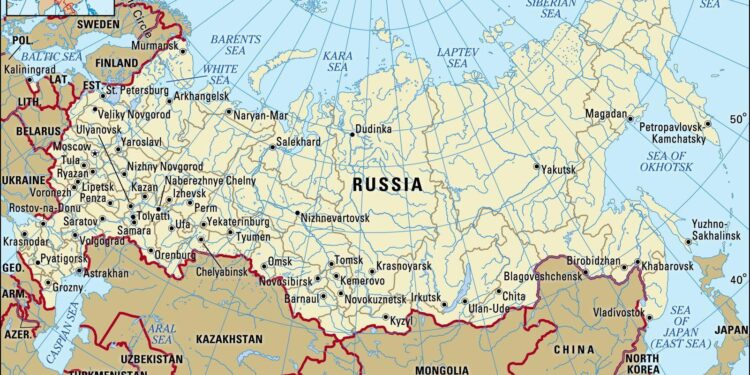Russia’s long-standing imperial strategy in the South Caucasus, particularly toward Armenia and Azerbaijan, is facing significant setbacks, according to a recent analysis by the Atlantic Council. Once the dominant external power shaping the region’s political and security landscape, Moscow’s efforts to maintain control through influence and intervention appear to be unraveling. This shift is reshaping the balance of power in a volatile area already scarred by decades of conflict, raising questions about Russia’s future role and the broader geopolitical implications for the South Caucasus.
Russia’s Dominance Strategy in the South Caucasus Sparks Regional Resistance
Russia’s long-standing strategy to exert control over Armenia and Azerbaijan through military presence, economic leverage, and political influence is facing unprecedented pushback. This approach, often described as neo-imperial, aimed to maintain Moscow’s dominant role in shaping the South Caucasus geopolitical landscape. However, both Armenia and Azerbaijan have begun to diversify their alliances, seeking stronger ties with Western institutions and regional powers, thereby diminishing Russia’s unilateral influence. The growing assertiveness of these nations reflects a broader regional desire for sovereignty and strategic autonomy, signaling cracks in Moscow’s once unchallenged dominance.
Several key factors underline this emerging resistance:
- Increased Lobbying for European Engagement: Armenia and Azerbaijan are intensifying diplomatic efforts to integrate into EU markets and security frameworks.
- Energy Diversification: Both countries are collaborating on energy projects that bypass Russian routes, reducing dependence on Moscow-controlled infrastructure.
- Local Nationalism and Independent Security Initiatives: There is a resurgence of national pride, with both states investing in self-reliant defense capabilities and seeking new partnerships beyond Russia.
| Factor | Impact on Russia’s Strategy |
|---|---|
| Diplomatic Realignment | Reduces Moscow’s negotiation leverage |
| Energy Independence | Weakens Russia’s economic grip |
| Military Modernization | Challenges Russian security dominance |
Consequences of Moscow’s Heavy-Handed Tactics on Armenia and Azerbaijan Relations
Russia’s assertive and coercive interventions in the South Caucasus have paradoxically deepened the rift between Armenia and Azerbaijan rather than fostering lasting stability. By attempting to impose its will through heavy-handed tactics, Moscow has fueled increased distrust and nationalist sentiment on both sides. Rather than acting as a neutral mediator, Russia’s approach is perceived as favoring one party at different junctures, exacerbating tensions and undermining diplomacy. This has led to a deteriorating security environment characterized by sporadic clashes and a heightened risk of renewed conflict.
Key repercussions of Russia’s strategy include:
- Strained bilateral relations with diminishing prospects for dialogue
- Empowerment of hardline factions resistant to peace efforts
- Increased regional instability impacting broader geopolitical dynamics
| Impact Area | Armenia | Azerbaijan |
|---|---|---|
| Political Trust | Declining confidence in Russia’s neutrality | Resentment over perceived favoritism |
| Security Situation | Heightened border tensions | Increased military readiness |
| Regional Alliances | Exploring alternatives beyond Moscow | Seeking stronger ties with Turkey |
Recommendations for Western Engagement to Counterbalance Russian Influence
To effectively counter Russia’s waning grip in the South Caucasus, Western policymakers must pivot toward a more strategic and nuanced engagement framework. This includes bolstering Armenia and Azerbaijan’s sovereignty by expanding economic partnerships beyond Moscow’s traditional sphere of influence. Investments in infrastructure, digital connectivity, and energy diversification can provide tangible alternatives, empowering these countries to make independent policy decisions. Moreover, sustained diplomatic efforts aimed at supporting regional peace processes should be prioritized, ensuring local stakeholders play key roles in conflict resolution without external coercion.
Simultaneously, strengthening civil society and democratic institutions across both nations will undercut Kremlin-friendly narratives that thrive on authoritarianism and instability. This can be promoted through initiatives such as:
- Exchange programs and educational scholarships to cultivate a generation tied to Western values and networks.
- Media support projects to enhance journalistic independence and counter disinformation campaigns.
- Security cooperation focused on border management and counterterrorism that respect sovereignty and human rights.
| Engagement Area | Western Role | Expected Outcome | ||||||||||||
|---|---|---|---|---|---|---|---|---|---|---|---|---|---|---|
| Economic Partnership | Infrastructure investments, trade deals | Reduced dependency on Russia | ||||||||||||
| Democratic Development | Support for NGOs, media freedom | Resilience against It looks like your table got cut off at the last expected outcome. Here’s a completed version of the table and an enhanced summary based on your provided text:
Summary: If you want, I can help further elaborate or format the content! Final ThoughtsAs tensions persist in the South Caucasus, Russia’s traditional role as the dominant regional power appears increasingly challenged. The Atlantic Council’s analysis underscores how Moscow’s attempts to enforce a top-down, imperial-style influence over Armenia and Azerbaijan have not only failed to secure lasting stability but have also contributed to greater instability and regional fragmentation. Moving forward, the evolving dynamics suggest that external actors and local stakeholders alike must reassess their strategies to foster genuine, sustainable peace in this complex geopolitical landscape. ADVERTISEMENT |
















